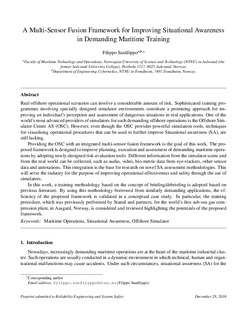| dc.contributor.author | Sanfilippo, Filippo | |
| dc.date.accessioned | 2017-12-14T11:12:02Z | |
| dc.date.available | 2017-12-14T11:12:02Z | |
| dc.date.created | 2017-07-10T10:58:32Z | |
| dc.date.issued | 2017 | |
| dc.identifier.citation | Reliability Engineering & System Safety. 2017, 161 12-24. | nb_NO |
| dc.identifier.issn | 0951-8320 | |
| dc.identifier.uri | http://hdl.handle.net/11250/2471693 | |
| dc.description.abstract | Real offshore operational scenarios can involve a considerable amount of risk. Sophisticated training programmes involving specially designed simulator environments constitute a promising approach for improving an individual's perception and assessment of dangerous situations in real applications. One of the world's most advanced providers of simulators for such demanding offshore operations is the Offshore Simulator Centre AS (OSC). However, even though the OSC provides powerful simulation tools, techniques for visualising operational procedures that can be used to further improve Situational awareness (SA), are still lacking.
Providing the OSC with an integrated multi-sensor fusion framework is the goal of this work. The proposed framework is designed to improve planning, execution and assessment of demanding maritime operations by adopting newly-designed risk-evaluation tools. Different information from the simulator scene and from the real world can be collected, such as audio, video, bio-metric data from eye-trackers, other sensor data and annotations. This integration is the base for research on novel SA assessment methodologies. This will serve the industry for the purpose of improving operational effectiveness and safety through the use of simulators.
In this work, a training methodology based on the concept of briefing/debriefing is adopted based on previous literature. By using this methodology borrowed from similarly demanding applications, the efficiency of the proposed framework is validated in a conceptual case study. In particular, the training procedure, which was previously performed by Statoil and partners, for the world's first sub-sea gas compression plant, in Aasgard, Norway, is considered and reviewed highlighting the potentials of the proposed framework. | nb_NO |
| dc.language.iso | eng | nb_NO |
| dc.publisher | Elsevier | nb_NO |
| dc.title | A multi-sensor fusion framework for improving situational awareness in demanding maritime training | nb_NO |
| dc.type | Journal article | nb_NO |
| dc.description.version | submittedVersion | nb_NO |
| dc.source.pagenumber | 12-24 | nb_NO |
| dc.source.volume | 161 | nb_NO |
| dc.source.journal | Reliability Engineering & System Safety | nb_NO |
| dc.identifier.doi | 10.1016/j.ress.2016.12.015 | |
| dc.identifier.cristin | 1481684 | |
| dc.description.localcode | This is a submitted manuscript of an article published by Elsevier Ltd in Reliability Engineering and System Safety, 31 December 2016. | nb_NO |
| cristin.unitcode | 194,63,25,0 | |
| cristin.unitcode | 194,64,93,0 | |
| cristin.unitname | Institutt for teknisk kybernetikk | |
| cristin.unitname | Institutt for havromsoperasjoner og byggteknikk | |
| cristin.ispublished | true | |
| cristin.fulltext | preprint | |
| cristin.qualitycode | 2 | |
